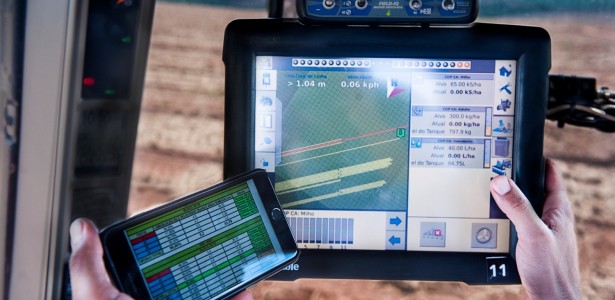
ST&I Policy
Studies assess the economic and social impacts of FAPESP research funding
Some of the results of research in areas such as agriculture, health, technological entrepreneurship, and public policy were presented during a seminar at the Foundation.
ST&I Policy
Studies assess the economic and social impacts of FAPESP research funding
Some of the results of research in areas such as agriculture, health, technological entrepreneurship, and public policy were presented during a seminar at the Foundation.
In 1999, FAPESP was responsible for more than half of the investments in agricultural science research in the state of São Paulo, according to a study by IPEA (photo: Léo Ramos Chaves/Pesquisa FAPESP)
By Elton Alisson | Agência FAPESP – From 1974 to 2020, agricultural productivity in the state of São Paulo increased by 67.6%. Corn, soybean, and orange production, for example, increased by 2.2%, 1.7%, and 1.6% per year, respectively, in terms of tons per hectare. Despite the increase in harvests, the amount of land used for agriculture and livestock in the state decreased from 16.6 million to 15.2 million hectares during this period.
A study by researchers from the Institute for Applied Economic Research (IPEA) indicates that these positive balances were mainly possible due to investments in science and technology made by FAPESP. The study examined the impact of public policies promoting ST&I on the growth of agricultural productivity in the state of São Paulo.
The main results of the study were presented on July 10th during the seminar “Research on Research and Innovation Project: Indicators, Metrics, and Evidence of Impacts.”
“FAPESP plays a central role in funding agricultural science in the state of São Paulo,” said José Eustáquio Ribeiro Vieira Filho, a researcher at IPEA and the study’s main author, during the event.
According to the data presented by Vieira, FAPESP’s share of spending on agricultural sciences as a percentage of total expenditure on science and technology in the state of São Paulo increased from 1% to 15% between 1976 and 1994, reaching its peak in 1999 when it accounted for over half of all expenditure. “FAPESP’s spending on agricultural science from 1974 to 2020 averaged 22%,” Vieira said.
The impacts of the Foundation’s investments in agricultural research are also reflected in the creation of science and technology-based startups offering solutions for the sector – the so-called agritechs – which are supported by the Innovative Research in Small Businesses Program (PIPE).
José Eustáquio Ribeiro Vieira Filho, researcher at IPEA: “FAPESP plays a central role in funding agricultural science in the state of São Paulo” (photo: Phelipe Janning/Agência FAPESP)
To measure the program’s impact on companies in this sector and others, researchers from the Engineering School of the University of São Paulo (POLI-USP) conducted a study with 16 beneficiaries. The researchers tried to identify how PIPE affected the businesses, how they used the resources, and the causes of their success.
“Some interesting statements that entrepreneurs gave us in the interviews were that without PIPE they wouldn’t have opened their companies and that the resources offered by the program helped them to take technological risks,” said Mario Sérgio Salerno, a professor at POLI-USP and coordinator of the study.
“Another thing that caught our attention was that all of them told us that the fact that articles about their companies had been published in FAPESP’s scientific media, such as Pesquisa FAPESP magazine, Agência FAPESP, and the Pesquisa para Inovação bulletin, was very important for giving visibility to their businesses and getting them in touch with investors,” Salerno said.
Health impacts
In the health sector, researchers from the State University of Campinas (UNICAMP) conducted a study on the measurable economic and social impact of projects funded by FAPESP. The researchers aimed to answer the following question: What is the economic and social return of an innovation funded by the Foundation in this sector?
Some of the challenges in conducting the study included identifying cases in which the innovation was ready with an established patent or intellectual property that had been approved by Brazilian health regulatory bodies and had been in effect for a long time to enable the measurement of impact in terms of lives saved. Additionally, the cases needed to have been funded by FAPESP and have a database that would allow the researchers to extract indicators of patients who benefited.
After mapping 22 cases, the researchers selected one: a 2009 protocol for treating acute lymphoblastic leukemia (ALL) developed by the Brazilian Group for the Treatment of ALL in Childhood (GBTLI).
Through studies conducted by different research groups in the state of São Paulo, largely funded by FAPESP, it was possible to establish a treatment protocol for the disease and identify a set of chemotherapy drugs with the best therapeutic effects, explained Luciano Coutinho, a professor at UNICAMP’s Institute of Economics and coordinator of the study.
“Through this incremental development there was a substantial gain in the survival rate of children treated using the protocol, which jumped from 70% to 79%,” he said.
Impact on public policies
Some sectors of society have grown skeptical of the social benefits of science produced by Brazilian universities. Motivated by this, a group of researchers from UNICAMP partnered with colleagues from the Federal University of Bahia to study the impact of FAPESP-funded research on public policies.
The researchers analyzed nearly 100,000 articles containing research results funded by the Foundation, which were gathered in FAPESP’s Virtual Library. They then checked the number of citations on Overton, a platform that collects data on public policy documents worldwide.
Of the nearly 100,000 analyzed articles from 1992 to 2023, 2,993 were cited in policy documents, primarily in the areas of health, the environment, and food security, by institutions such as the World Health Organization (WHO) and the Food and Agriculture Organization of the United Nations (FAO).
“This demonstrates the strong alignment between FAPESP’s funding priorities and policy-relevant areas such as health, the environment, and agriculture,” said Evandro Coggo Cristofoletti, a professor at UNICAMP and one of the study’s coordinators.





